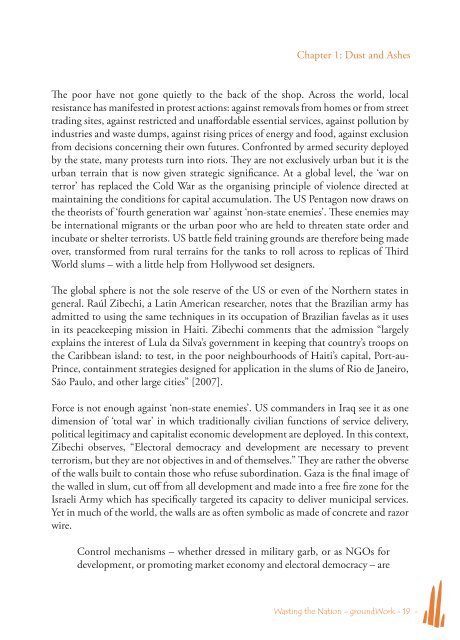Wasting the Nation.indd - Groundwork
Wasting the Nation.indd - Groundwork
Wasting the Nation.indd - Groundwork
Create successful ePaper yourself
Turn your PDF publications into a flip-book with our unique Google optimized e-Paper software.
Chapter 1: Dust and AshesThe poor have not gone quietly to <strong>the</strong> back of <strong>the</strong> shop. Across <strong>the</strong> world, localresistance has manifested in protest actions: against removals from homes or from streettrading sites, against restricted and unaffordable essential services, against pollution byindustries and waste dumps, against rising prices of energy and food, against exclusionfrom decisions concerning <strong>the</strong>ir own futures. Confronted by armed security deployedby <strong>the</strong> state, many protests turn into riots. They are not exclusively urban but it is <strong>the</strong>urban terrain that is now given strategic significance. At a global level, <strong>the</strong> ‘war onterror’ has replaced <strong>the</strong> Cold War as <strong>the</strong> organising principle of violence directed atmaintaining <strong>the</strong> conditions for capital accumulation. The US Pentagon now draws on<strong>the</strong> <strong>the</strong>orists of ‘fourth generation war’ against ‘non-state enemies’. These enemies maybe international migrants or <strong>the</strong> urban poor who are held to threaten state order andincubate or shelter terrorists. US battle field training grounds are <strong>the</strong>refore being madeover, transformed from rural terrains for <strong>the</strong> tanks to roll across to replicas of ThirdWorld slums – with a little help from Hollywood set designers.The global sphere is not <strong>the</strong> sole reserve of <strong>the</strong> US or even of <strong>the</strong> Nor<strong>the</strong>rn states ingeneral. Raúl Zibechi, a Latin American researcher, notes that <strong>the</strong> Brazilian army hasadmitted to using <strong>the</strong> same techniques in its occupation of Brazilian favelas as it usesin its peacekeeping mission in Haiti. Zibechi comments that <strong>the</strong> admission “largelyexplains <strong>the</strong> interest of Lula da Silva’s government in keeping that country’s troops on<strong>the</strong> Caribbean island: to test, in <strong>the</strong> poor neighbourhoods of Haiti’s capital, Port-au-Prince, containment strategies designed for application in <strong>the</strong> slums of Rio de Janeiro,São Paulo, and o<strong>the</strong>r large cities” [2007].Force is not enough against ‘non-state enemies’. US commanders in Iraq see it as onedimension of ‘total war’ in which traditionally civilian functions of service delivery,political legitimacy and capitalist economic development are deployed. In this context,Zibechi observes, “Electoral democracy and development are necessary to preventterrorism, but <strong>the</strong>y are not objectives in and of <strong>the</strong>mselves.” They are ra<strong>the</strong>r <strong>the</strong> obverseof <strong>the</strong> walls built to contain those who refuse subordination. Gaza is <strong>the</strong> final image of<strong>the</strong> walled in slum, cut off from all development and made into a free fire zone for <strong>the</strong>Israeli Army which has specifically targeted its capacity to deliver municipal services.Yet in much of <strong>the</strong> world, <strong>the</strong> walls are as often symbolic as made of concrete and razorwire.Control mechanisms – whe<strong>the</strong>r dressed in military garb, or as NGOs fordevelopment, or promoting market economy and electoral democracy – are<strong>Wasting</strong> <strong>the</strong> <strong>Nation</strong> - groundWork - 19 -
















